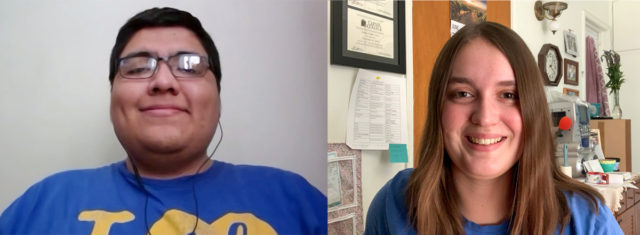Despite having their time at UCLA cut short by the COVID-19 pandemic, transfer students have still found positives and connections through various on-campus communities.
Many graduating transfer students highlighted their disappointment at having their time at UCLA shortened due to the pandemic.
“I’m still actually a little bit devastated,” said Emily Vose, a fourth-year Spanish language and culture transfer student from Cuesta College. “I was thinking about it last night, the magic that you feel on campus and how meaningful it is to be there, (it’s) not the same.”
Josue Ramirez, a fifth-year physiological science transfer student from Santa Ana College, described a similar disappointment.
“I wanted to meet more people and do more networking or get involved in research, but I didn’t have the opportunity to because I went online,” Ramirez said.
However, many transfer students have still been able to find community among other transfer students, specifically through the Transfer Mentorship Program with the UCLA Transfer Student Center.
“I love the Transfer Center; I think the transfer community is unmatched at UCLA, that’s kind of why I chose it,” Vose said. “We know that even if the administration is not going to have our back, our community always does.”
Other transfer students held similar sentiments.
Gabriela Magaña, a fourth-year sociology transfer student from Pasadena City College, said she found comfort in joining the Undergraduate Students Association Council and the Transfer Student Center, among other student organizations. She was glad to mentor other transfer students in the TSC and improve the representation of transfers in USAC, she said.
Vose similarly said she felt a sense of pride as a transfer student but emphasized the need to reverse stigmas surrounding the transfer student community.
“People need to start shifting their mindset a little bit and start recognizing that just because someone went to community college doesn’t mean they’re underprepared,” Vose said. “They’re more prepared, just in a different way.”
This stigma contributes to the lack of transfer student representation in student government and other campus organizations, Vose said. Vose said she felt frustrated upon coming to UCLA and seeing that transfer students only had one representative in USAC, despite making up more than a quarter of each graduating class.
Some students said the transfer experience at UCLA could still be improved.
Vose said she felt like transfers were being neglected by the UCLA administration after they announced that class of 2022 transfer students would no longer be guaranteed housing as originally planned because of pandemic-related capacity limits.
[Related: Class of 2022 transfer students call on UCLA to guarantee housing for fall]
Ramirez felt that there needs to be more visibility of transfer issues to help them feel more welcome and supported.
If he had been given the opportunity to return to campus, Ramirez said he would have wanted to increase awareness about issues concerning the transfer student community, such as financial aid and scholarships for transfer students.
Although their time on campus was not as expected, Magaña, Vose and Ramirez all highlighted how UCLA played a key role in their future plans: their time at the university helped them grow confident in their passions.
Participating in Synapse, an organization providing social support for brain injury patients, motivated Ramirez to pursue medical or nursing school, he said.
Vose plans to work for Teach for America after learning about the educational inequity and discrimination Latino students face in a Chicana/o and Central American Studies class.
“We have to change the system, the system’s a disaster,” Vose said. “It starts with kids and it starts (with) teaching, and I was like, maybe Teach for America is a good start for that.”
Magaña felt her time at UCLA has encouraged her to continue to pursue higher education beyond graduation. She plans to soon pursue a master’s degree in urban and regional planning after a year break to rest and work as a community organizing intern helping develop tenant leadership in South Los Angeles with Strategic Actions for a Just Economy.
“Leaving the school, I am so much more confident in myself and in my future than when I first entered,” Magaña said. “I know that I’ve made friendships that are going to last me a lifetime.”
Contributing reports by Constanza Montemayor, assistant news editor.

